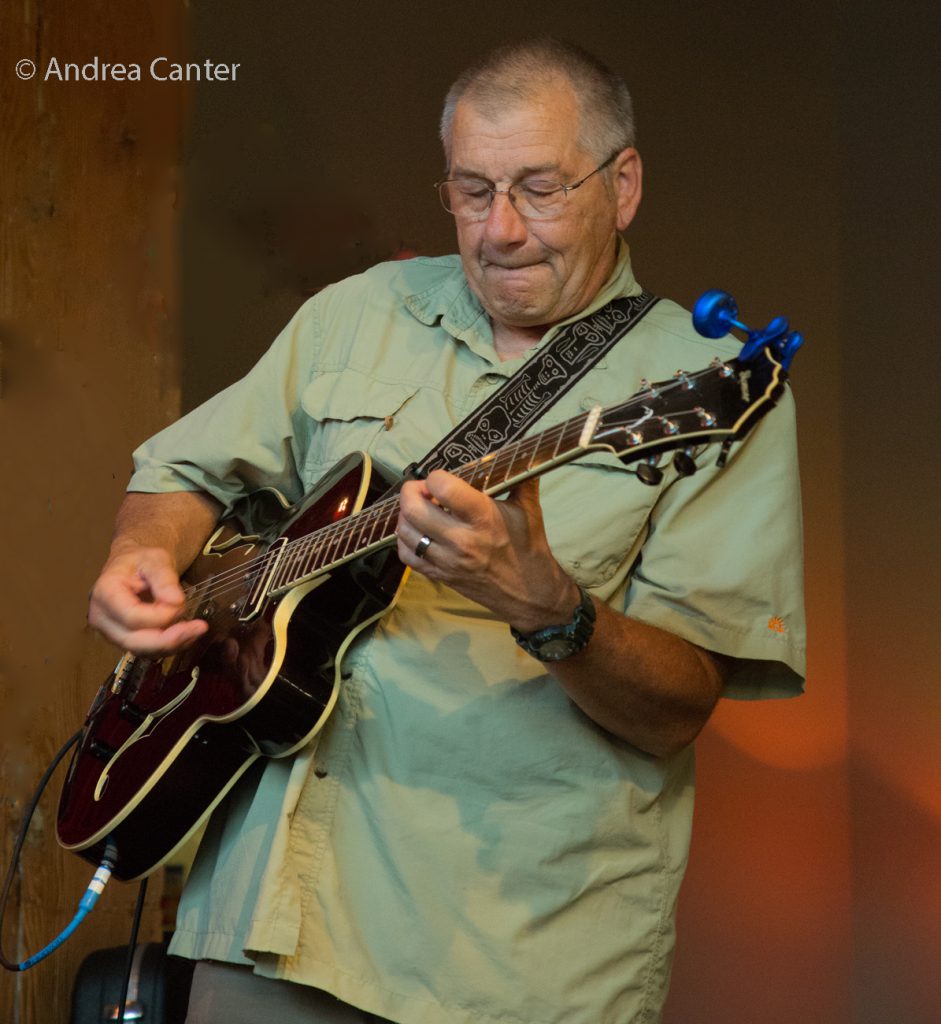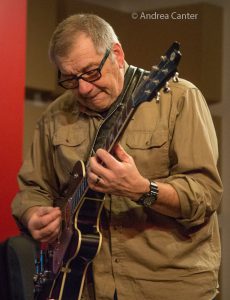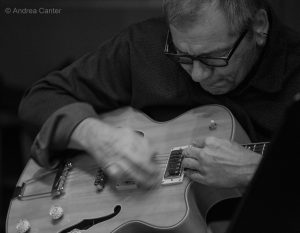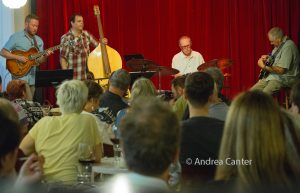Dean Granros is an elusive giant of the Twin Cities improvised music scene. The name alone carries weight for younger generations of musicians and fans. His photo hangs on the back wall of Jazz Central Studios, larger than all the others. I was hanging out around it a few weeks back when a non-musician friend asked me, “Who is Dean Granros?” I struggled to find a good answer. “Dean Granros? Dean Granros?” I replied. “He’s a legend, right? He played in that supergroup, and didn’t he cut a record with Zacc Harris?” The conversation ended with more uncertainty than insight. I was embarrassed by how little I knew about Granros. For a musician whose name produces automatic respect in many Twin Cities jazz circles, I sure was foggy about the details of his greatness.
Not so long after, I noticed that the guitarist would be playing a solo set for Saturday Night Jazz at The Black Dog. This was a no-brainer for me: I was going. I’ve learned not to treat these types of situations as coincidences, but to trust the music gods and understand my attendance of certain shows as a duty rather than an option. So on October 19, I walked into the Lowertown café with purpose. Granros had already started plucking. Immediately, I noticed his comfort level, musically and physically. Totally cool. I reckon he’d play the same way in front of 30,000 people as he would three. Sure, age and experience might account for it. (I once asked Eric Kamau Gravatt, “How do you play so relaxed?” He laughed before responding, “I must play relaxed. I’m old!”) But Granros’s comfort on stage can’t be fully explained by either. There’s something else going on, something that became more obvious as the night went on. It’s that Granros is a natural musician. His music sounds the way music does when it comes from an authentic place, a place that can’t be faked. As he dove into a rendition of “Monk’s Mood,” Granros swayed across his chair, danced his shoulders, and subtly bobbed his head. His performance embodied rhythmic genius, and invited the audience to participate in something special. I’d never heard Monk’s tune played like that. The effect on the room was bittersweet. On me it was amazement.
After the show, I felt like I had made a discovery. I knew Dean Granros was good, but I didn’t know he was that good. Nobody can play a solo set like that, let alone play solo Monk so well, I thought. Of course, this wasn’t first time someone had discovered the brilliance of Dean Granros. I knew I had to reach out to veterans of the Twin Cities scene to get more perspective. Drummer Jay Epstein was happy to open up about a musician for whom he’s held decades-long admiration and respect. “I’ve been in somewhat of a long-term love affair with Dean,” Epstein said.”There is nobody like Dean around here.” The two worked together in a trio with bassist Jeff Johnson from 1973-79, as well as in a quartet called Lapis, during the same time, with bassist Tom Lewis and saxophonist Pat Moriarty. The few recordings from the period contain imagination and dexterity. “Dean always had a personal vision,” Epstein says. “There were other freer players at the time, but they didn’t have the same depth.” I wanted to know if this depth could be explained. “He’ll find something in many different types of music” Epstein explained, “things people don’t expect.” He paused, adding, “Dean’s playing encompasses a lot of different directions.” I agreed. That’s exactly the feeling I got listening to Granros, the sense that he represents many great musical traditions. “OK, Jay, how about I guess some influences on Dean and you tell me if I’m in the ballpark?” “Shoot” “Django Reinhardt, Mississippi Fred McDowell, Hendrix, Steve Lacy, Sonny Sharrock?” Epstein flattered me with his enthusiasm, “Yes! Yes! Yes!”
I wanted to speak with more contemporaries of Granros, so I reached out to another Twin Cities drumming legend, Phil Hey. Hey most notably played alongside Granros in a trio formed in 1983 with bassist Richard Paske called Wingless Transportation. Yet, it was the guitarist’s work 10 years earlier, with a band that didn’t include Hey, which the drummer spoke of first. “Oh yeah, check out Whole Earth Rainbow Band” he recalls fondly.”We thought they were amazing.” WERB’s self-titled first record from 1972 is a collage of free improvisation, energetic swing, composition, and a group incantatory scat in which they repeatedly chant “the hour glass.” I remembered Epstein telling me that Granros crafted a personal vision from multiple influences. In a way, WERB was trying to do the same thing, but as a band. “Yeah, they were kind of like what fusion was supposed to be,” Hey said, only half-kidding, “but they were an actual band with a band ethos. That was important. Dean was easily the most influential member because of his writing and his playing.” Within that framework, according to Hey, Granros helped to “blend free improvisation” into a style which would prove influential to subsequent Twin Cities musicians, from Anthony Cox to Craig Taborn to Jordan Anderson. Granros used the power of the past to point towards a future. “He’s got serious Delta blues in his playing, and a real Americana strain. Come to think of it, he was sort of Bill Frisell before there was Bill Frisell.” I got real excited at the accuracy of Hey’s remark and hastened to add “Granros swings harder.”
Having put together some pieces of the puzzle, I found myself wondering: what’s the guitarist up to now? It didn’t take long to find out. Besides playing awesome solo guitar sets at the Black Dog, he’s playing standards with Josh Granowski at the Icehouse. I found Granros’s bandcamp website and checked out a recording of the duo from September of this year. It contains the Granrosian themes: authenticity, musicality, virtuosity, and creative freedom. They treat standards like “September Song” and “There Is No Greater Love” with that blend of earnest idiomaticity and relaxed subversion which jazz music is uniquely qualified to handle. I talked to Granowski about playing with Granros. “He’s not afraid to do anything,” said the bassist. Yet, it’s a modest fearlessness, “Dean’s music is raw, traditional, explorative, without being too showy.” I caught the duo’s second performance at Icehouse on October 26. They showed sustained creative effort at what was predominantly a dinner gig. “You think you’re playing tunes at a wallpaper gig but you’re not,” Granowski says. “There is no distinction for Dean. He never just plays the tune. He is deeply critical about his approach to each tune, every time.” The same magic I felt a couple of weeks earlier at the Black Dog permeated the air.
In addition to his new partnership with Granowski, Granros returned to the Black Dog on October 12 with the quartet Tall Tales. The band is an excellent collection of Twin Cities musicians which includes guitarist Zacc Harris, bassist Chris Bates, and Jay Epstein. Their first and only record from 2015 features five Granros compositions, one by Monk, and one by Django Reinhardt. I caught Harris at his regular Riverview Wine Bar gig and asked him for his thoughts on Granros, to which he responded, “Dean’s playing has a duality. He plays non-guitar-like but in a guitaresque way.” I appreciated the paradox immensely. “How’s it feel to be on stage with him?” I asked. Harris smiled, he seemed to be in the same headspace entered by every musician I’ve spoken to about Dean — , that of mystery, enigma, appreciation and awe. “Here’s a quote for you,” Harris said. “Dean is like a car that has an endless number of gears.”
After all my digging, I couldn’t help but conclude that Granros is a Midwest treasure and a giant of American music. He reminds me of Monk, not just because he’s mastered the whole-tone scale, but because he insists that he be most like himself. According to Jay Epstein, Dean has spent a lifetime searching for his own voice, and that is the most valuable thing a musician has.










